REBUILDING SOUTH AFRICA OP-ED
‘Go Back, Give Back, Build Back’ – how to best honour the spirit of the UDF on its 40th anniversary
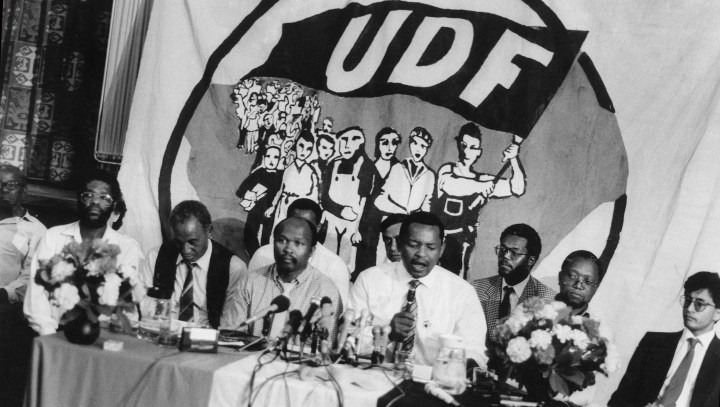
If we are serious about honouring the United Democratic Front we must be sensitive and thoughtful in our approach. We have a simple proposal to all those who care for our country and all those who served the UDF and feel the need to commemorate this important 40-year milestone. We propose that we organise around the slogan ‘Go back, Give back, Build back’. Let’s go back to the communities where we served in the UDF period, give back using the skills, privilege and resources we’ve secured in the years since then, and do what we can to help build back our communities.
In the past three years, South Africa has declared two official states of disaster, the one related to Covid-19 and the other to the electricity crisis. But the reality for most people in the country is that their lives are in a permanent “state of disaster”, regardless of whether the government makes a formal declaration in Parliament in terms of the Disaster Management Act (2002).
The Constitution of South Africa, fought for with the blood, sweat and tears of millions of South Africans, guarantees the progressive realisation of social and economic rights. However, what we are witnessing today is the opposite.
Across the country we witness a sustained deterioration in socioeconomic rights to housing, healthcare services and sufficient food and safe, drinkable water. Access to electricity and delivery of the most basic municipal services, such as rubbish collection and disposal, is diminishing exponentially, resulting in severe limitations on healthcare, education, public and road safety and the overall well-being of our people.
According to Stats SA, “55.5% of the total population live below the upper-bound poverty line of R1,335 a month, and a quarter (13.8 million people) live below the food poverty line of R624 a month” with a 32.9% unemployment rate. And, of course, there are hundreds of thousands who still do not have safe and sustainable housing.
In addition, an increasing number of people who may not be suffering abject poverty nevertheless find themselves in a situation where their mental health and well-being are threatened by deepening inequality, high levels of corruption and the inability of the government to address the energy crisis, climate change and worsening levels of violence and crime.
While the despondency and frustration arising from the situation has reduced mass public participation in addressing our society’s challenges, there is a growing sense of impatience, concern and frustration that calls for people to stop being passive spectators while our country falls apart.
We are a nation born out of a national liberation struggle that thrived on public mobilisation, especially during the UDF years. It is therefore imperative that we return to our roots if we are to arrest the current decline and contribute proactively to a national redevelopment project.
A moment for change
We find ourselves in a moment similar to that which occurred during the struggle years – when organisations across racial, religious, provincial and class divides recognised that the country faced an unprecedented political and economic crisis. The response was to form the United Democratic Front – a collective of inclusive, unifying, decentralised, democratic, participatory movements in multiple sectors across the country – on 20 August 1983.
The contributions and sacrifices of UDF activists, together with the efforts of underground organisations and the support of the international community, led to the establishment of a democratic South Africa in 1994.
To address the challenges facing South Africa today – challenges as critical as those confronting us in 1983 – we need to push for the highest levels of public participation, similar to those of the UDF years.
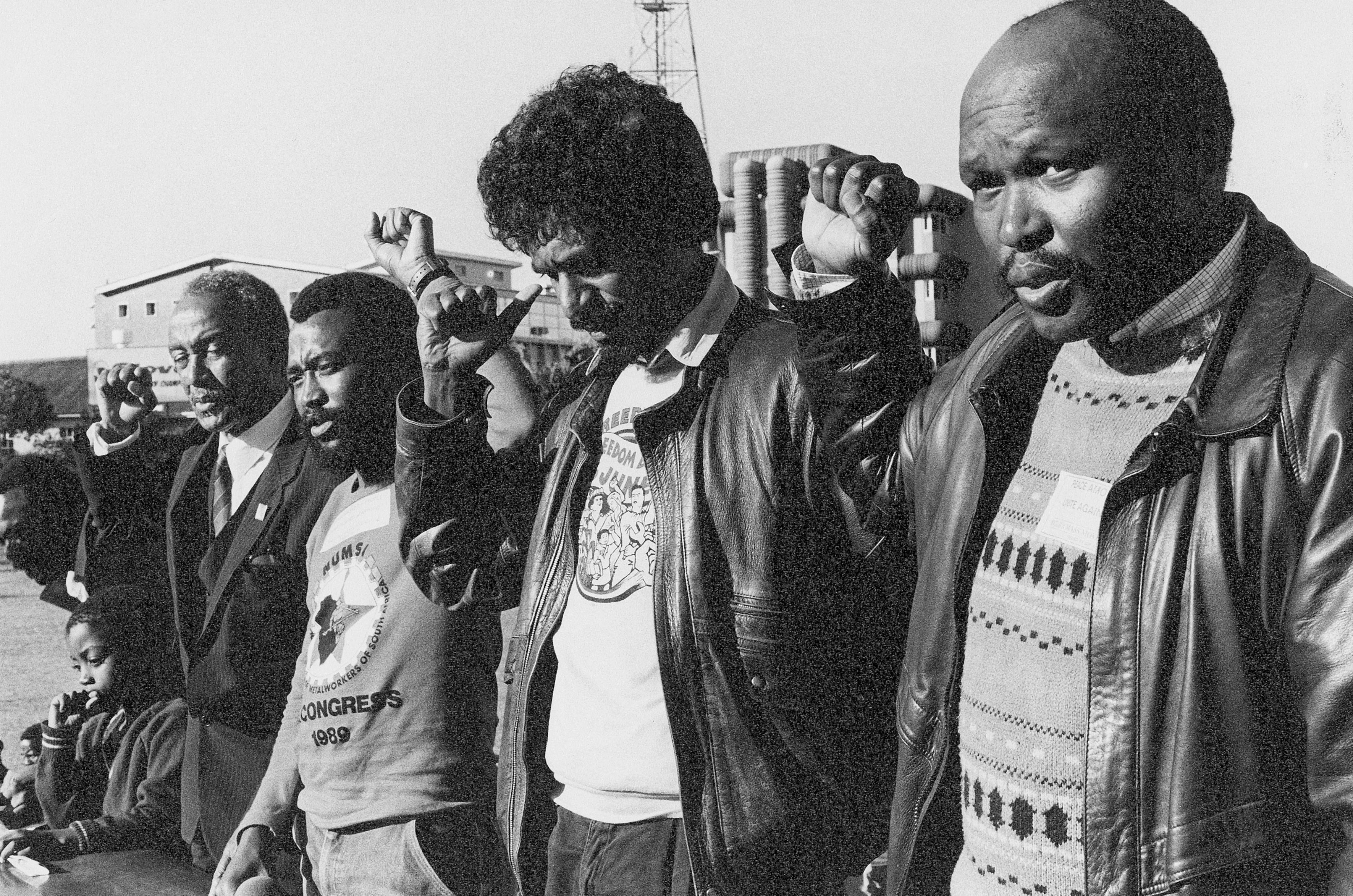
COSATU and UDF leaders L-R Archie Gumede, Jay Naidoo, Murphy Marobe during the COSATU Peace Conference in Durban, (Photo by Gallo Images / Rapport archives)
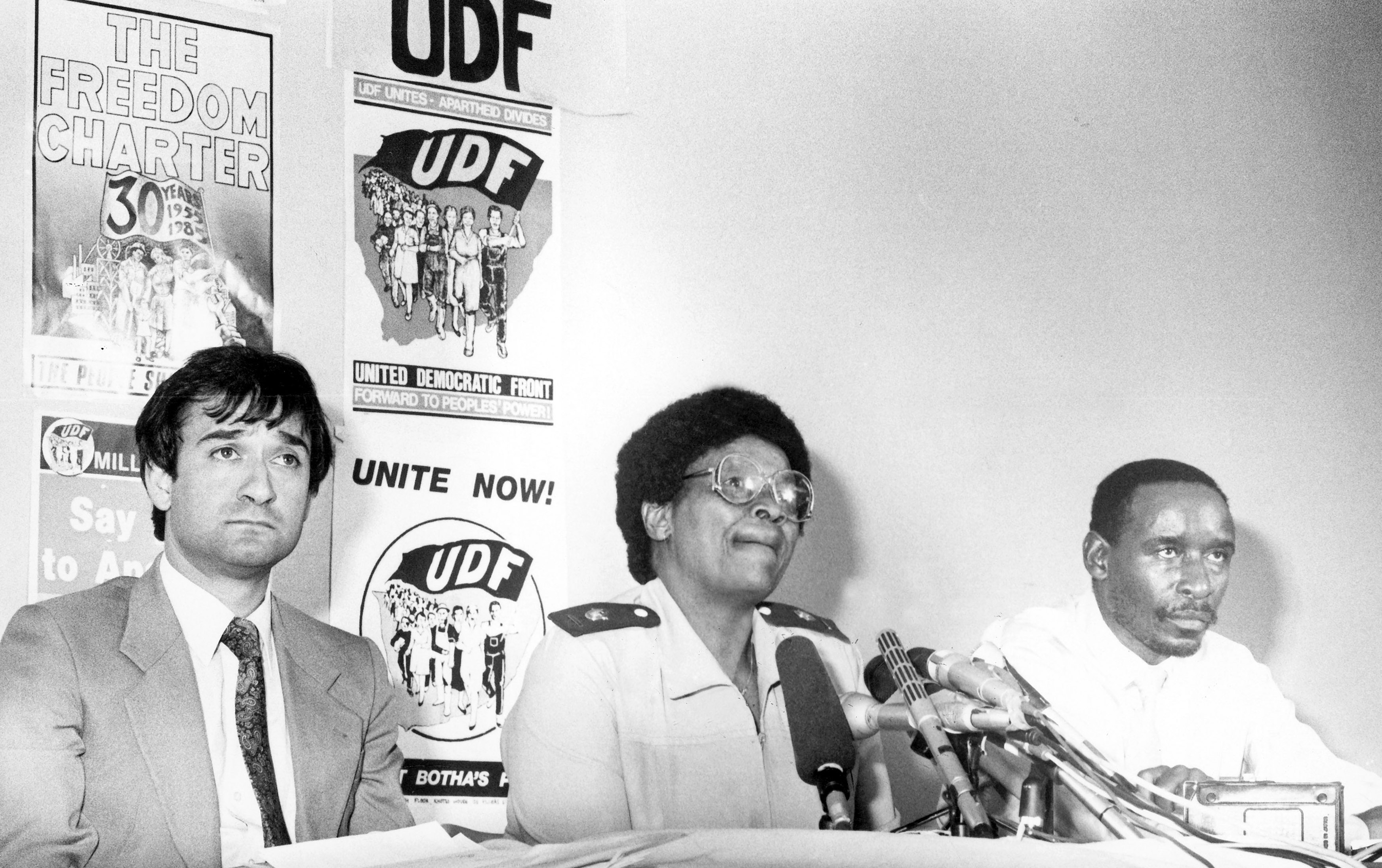
From left: UDF treasurer Azhar Cachalia, UDF co-president Albertina Sisulu and UDF chairperson Sam Ndou at a press conference. (Photo: Gallo Images / Rapport archives)
The UDF’s key purpose was to mobilise the largest number of people to oppose the apartheid government and the effects of its separatist policies on the lives of all South Africans.
What we need is a new kind of activism, one which mobilises people to care about and rebuild their communities.
However, it was also much more than mere political opposition. It was about encouraging and enabling people to participate in knowing and exercising their rights, few though they might have been at the time, in respect of very practical day-to-day services.
This was achieved, in part, through the running of advice offices in communities which taught people how to get grants from the state, how to apply for a pension, how to motivate for reductions in electricity bills, and how to access – and demand – various other practical services that were, or should have been, available to them. This sometimes included litter clean-up campaigns and the establishment of “People’s Parks” to make life survivable under apartheid.
Teachers also played a critical role, going the extra mile by educating students with skills on how to run organisations, how to take minutes, how to draw up pamphlets and prepare documents. Many contributed by working after official school hours to render these extracurricular activities to their students.
These are values that we need to re-inculcate.
We need to galvanise similar levels of participation, not simply to hold our government to account, push for more effective electoral outcomes, or encourage the emergence of new progressive voices in governance. What we need from this participation is a new kind of activism, one which mobilises people to care about and rebuild their communities, assisted by access to information and resources which will help them to improve their capacity to work together strategically and effectively.
Already, people in thousands of places across South Africa are actively engaged in efforts to make things work in their communities. Their efforts will be boosted by a renewed drive to encourage public participation, just as new organisations will benefit from their knowledge and experience.
Read more in the Daily Maverick: I’ve seen the future and it works – if we want it to
The energy of existing organisations, and of people ready and willing to be mobilised, can be galvanised to fix problems which the government clearly lacks the political will to address. Through our collective efforts, we can shame the government into action by showing that it is not impossible to have an ongoing, sustainable programme for fixing potholes, cleaning roads and pavements, ensuring that parks and other public spaces are pleasant and safe, and that our neighbourhoods don’t look like post-apocalyptic death traps.
The challenge we have is that we are confronted by a government and a political class that are out of touch with the reality of day-to-day life of most people in the country. Millions in government funds are used to create a buffer between, on the one hand, serving politicians and senior public servants and, on the other, the rest of the population. These funds are used to protect them from the discomforts suffered by most people in the country daily. The result is that they feel no real incentive to ensure that service delivery issues are addressed.
We and others have concerns that there may be attempts to co-opt this significant anniversary to remedy the ANC’s declining electoral chances.
So we have a situation in which rural areas, as well as most townships that were historically marginalised, still lack basic services. And those areas which, under apartheid, had access to reliable electricity and water supplies, maintained roads, hospitals, schools, parks, recreation and sporting facilities, transport services, effective policing and so on are themselves experiencing a reduction in service delivery and the standards they enjoyed in the past.
The consequences are dire for everyone: learners, students, the elderly, women, patients in hospitals, people with disabilities, small businesses, workers, urban and rural dwellers and countless others whose daily lives are made intolerable by the failure of the government to carry out their basic duty of care to the people of the country.
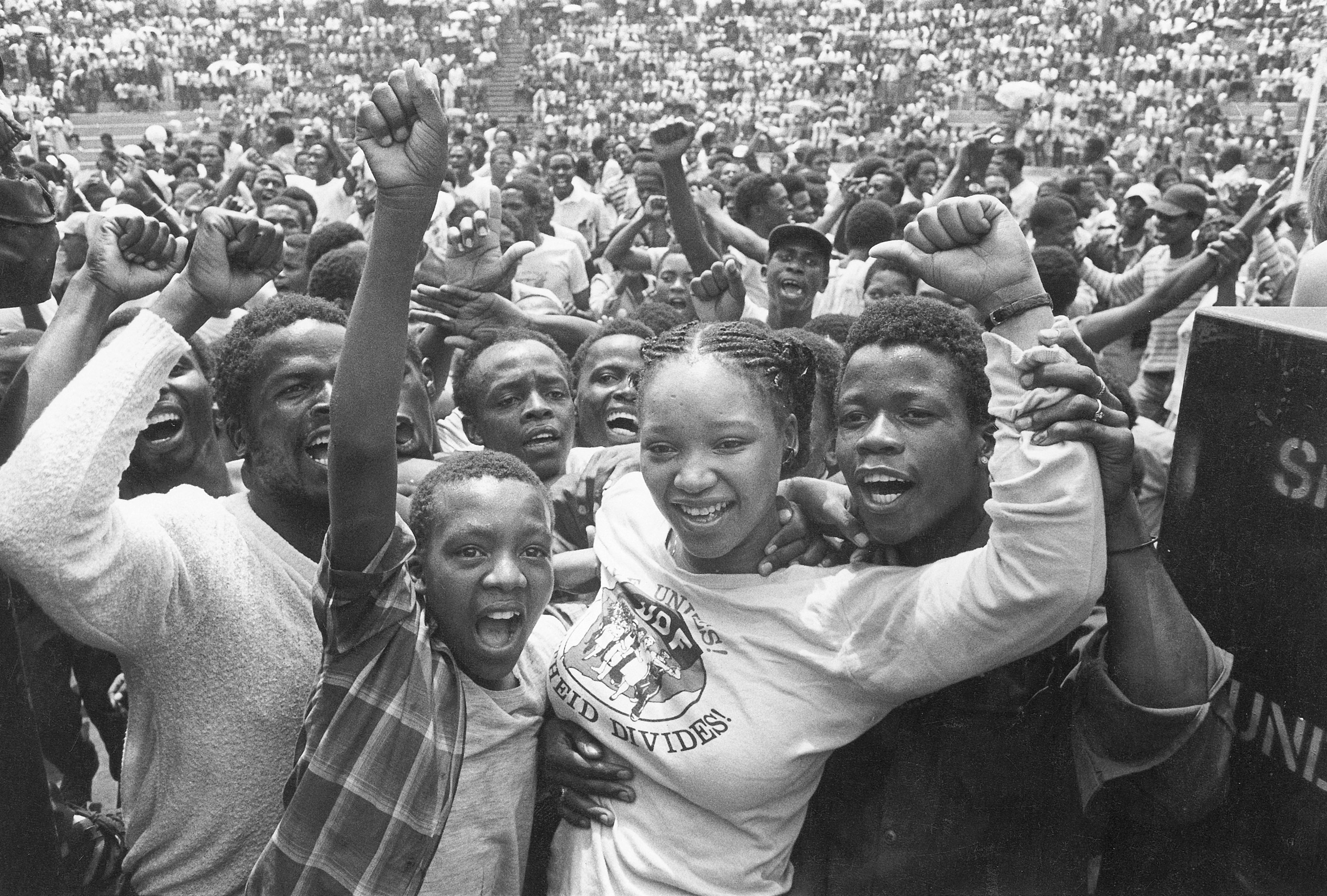
Zindzi Mandela during a UDF rally. (Photo: Gallo Images / Rapport archives)
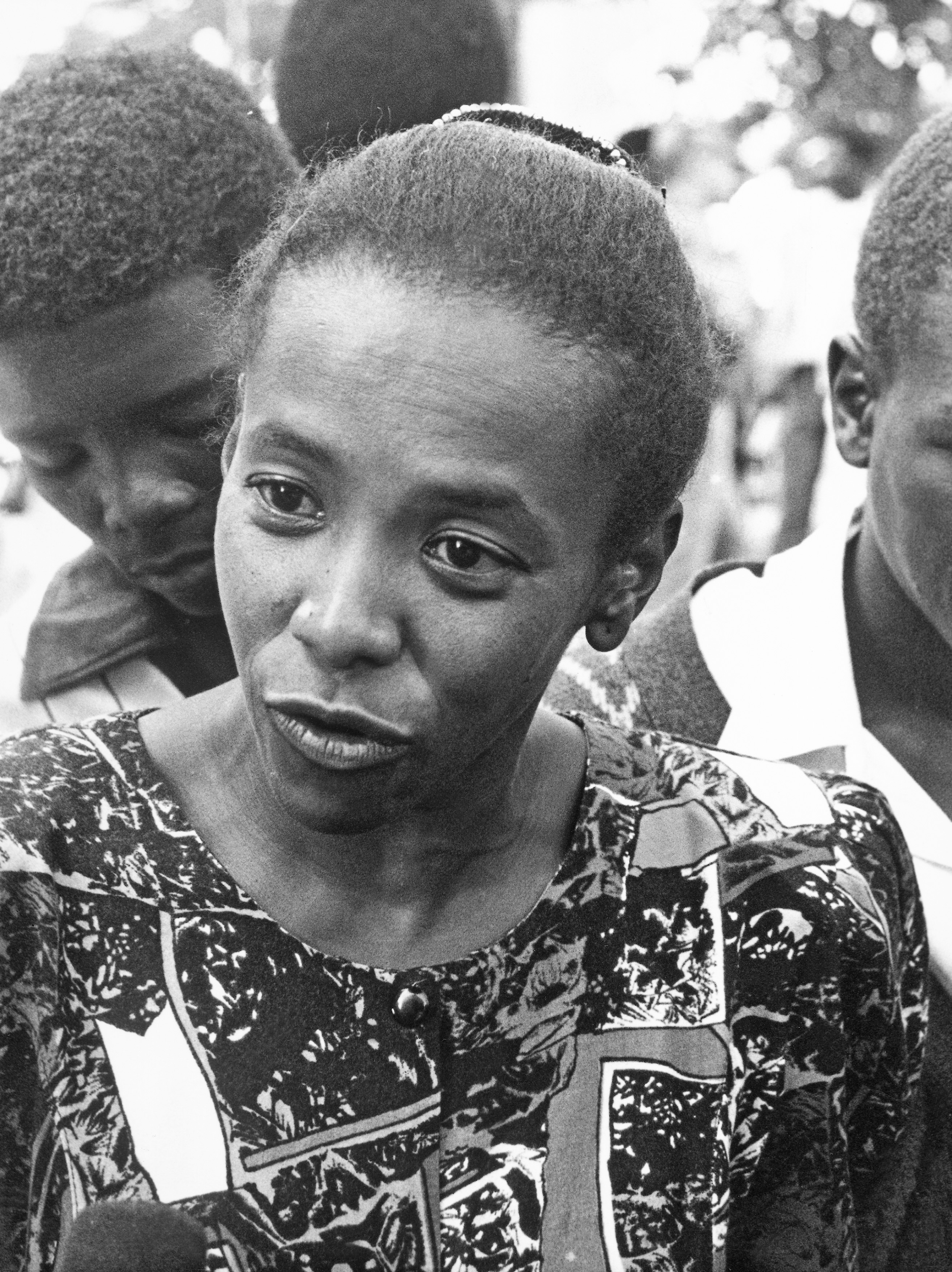
Cheryl Carolus, a United Democratic Front Leader in the eighties, seen at a rally. (Photo supplied)
A time for rededication to communities, not celebration
In the run-up to the 40th anniversary of the UDF, there are ongoing conversations about holding celebrations to commemorate the historic, heroic and courageous efforts of the people of our country who willingly gave of themselves in order to be part of ushering in a new, vibrant democratic order in South Africa. So far, at least, it seems that these conversations are mainly about holding rallies and other conventional celebratory events.
We believe that engaging in celebratory activities, while our country is in deep crisis and the majority of our people are experiencing unconscionable and indefensible suffering, would be extremely insensitive and should therefore be avoided. In addition, we and others have concerns that there may be attempts to co-opt this significant anniversary to remedy the ANC’s declining electoral chances by directly linking the work of the UDF to the ANC and encouraging people to see a vote for the ANC as a vote for the values and principles of the UDF.
However, the UDF was never expressly an ANC structure. While many UDF activists were ANC supporters or members, including both of us, not all organisations or individuals were – the UDF was deliberately established as a “broad church” which would allow for collective action by all those united in their opposition to apartheid and their desire for a democratic, egalitarian South Africa. Support for the ANC was therefore not a criteria for being part of the UDF.
The writers were part of former UDF affiliates – one of us was present at the UDF launch in 1983 – who were involved until the UDF was disbanded in 1991. As such, we firmly believe that it would be a great betrayal to the memory of those who gave their all for the UDF – their commitment, their freedom and sometimes their lives – if we simply “celebrated” with the allocation of resources for the holding of rallies and public gatherings at which stirring speeches are made to recall the past, but little else is done to revive and keep alive the spirit of meaningful participation and democracy.
If we genuinely want to honour and commemorate the sacrifice of those who served the struggle against apartheid and to continue to embody the values and principles of the UDF, we must, first and foremost, acknowledge the truth: that our country is in a continuing state of disaster and that something must be done to correct the situation.
The UDF taught us that strong and well-organised communities are essential.
During the struggle, and just after the election of our first democratic government, we witnessed democratic participation through street committees and zonal committees, youth organisations, women’s organisations, arts and culture initiatives, student bodies, sporting structures and many other civil society formations, all fostering a level of democracy that seems like a distant dream in our current dispensation. We believe that if we had maintained that depth of democratic participation, the crime, corruption and lack of service delivery in all forms would not have taken root in the way it has over the past three decades.
Thus, if we are serious about honouring the UDF, we must adopt a new approach.
‘Go back, give back, build back’
We have a simple proposal for all those who care for our country, who served the UDF in some way, and who feel a need to commemorate this important 40th anniversary of the launching of the UDF. And we believe our message will also resonate with the large numbers of frustrated young people who feel they must do something constructive to prevent our country – their country – from falling apart.
Today, many of us no longer live in the communities where we served in the UDF years. So we propose that we organise around the slogan “Go back, Give back, Build back”.
If you’ve made it in business, then go back into the community in which you worked in the UDF days and help set up a small business to employ some of the people in that community.
This means going back to the communities where we served in the UDF period, giving back with the skills, privilege and resources we’ve secured in the years since then, and doing what we can to help (re)build back our communities.
Let’s join forces with organisations already striving to reclaim our democracy, organisations that exist in just about every grassroots locality around our country. This includes organisations in the faith movement, elements of the trade union movement that are not compromised, and a range of society organisations focusing on a broad range of issues.
Let’s put together what we learnt from the UDF years and what is happening on the ground today to produce toolkits and resources to help more people to organise at the local level.
If you’ve made it in business, then go back into the community in which you worked in the UDF days and help set up a small business to employ some of the people in that community. If you have engineering skills, go back and help people to set up a process to enable access to water for all or to fill the potholes in the roads (using the correct road-engineering methods).
By doing this, we can challenge local and provincial governments to stop dragging their feet and to partner with communities to ensure that these and other issues are effectively and efficiently dealt with.
There are lots of amazing things happening in communities across the country. Many are not waiting for someone to come with help – instead they are taking the initiative and are trying their best to be resilient and survive. We need to look at what’s working and help build on these energies. Let us enable people to find their voice. We must begin to focus on the power that people have, as opposed to the power that we do not have. The harsh reality is that we have to become resilient, if we are to survive.
Part of what we need right now is to rebuild.
Many communities have been forgotten. We need to support the re-emergence of strong youth and women’s organisations and genuine independent civic organisations that have the capability to give people an option to participate, an option to find dignity and an option to reclaim our democracy at local level.
As the Gift of the Givers has said, “the aim is to rebuild a nation by passing on skills, implementing sustainable practices, outfitting and starting clinics, drilling boreholes, and instilling hope”.
South Africa stands at a precipice. Our communities are in pain, and the future looks bleak. However, the 40th anniversary of the UDF gives us an opportunity to reinvigorate the values and spirit of the UDF in the country.
If we use this moment to organise ourselves at the grassroots level, we have a fighting chance to restore our democracy and rebuild our nation. This grassroots effort might be what we need to reimagine the structural and systemic changes necessary to build the kind of national governance we desperately require. Pessimism is a luxury we simply cannot afford, and the pessimism of our analysis can only be overcome by the optimism of our creativity, thoughts and actions. DM
Kumi Naidoo and Louisa Zondo are members of the Yeoville Bellevue Ratepayers Association and are co-founders of the Riky Rick Foundation for the Promotion of Artivism.




















 Become an Insider
Become an Insider
Same exhortation as Rise Mzanzi almost verbatim. The trouble is getting past the entitlement affliction so prevalent more particularly in the youth who believe it should just be given to them without any effort on their part
Sadly there is that word again – Activism
There is too much activism overriding decent, sensible decision making.
The revolution ended, our votes count.
Voting apathy is complicity, allowing for corruption to flourish, compounding suffering and venerating rudderless leadership.
Activism. That word again? Yes, Liam – and it’s not a swear word. Activism is what we need more of to overcome the indecent nonsense and lack of meaningful decision-making so prevalent in government circles.
Your statement that “the revolution ended” is, I’m afraid, premature. What that revolution accomplished was giving the same rights as white South Africa enjoyed for decades to the black majority. This was hardly revolutionary – it was simply doing what is humane. Where that revolution fell short, was in not following through on the obvious needs that should have been filled. Such as education for the previously disadvantaged. But then, as with the National Party before them, the current national party – the ANC – recognises the power of an uneducated populace, or what I think of as a mushroom populace – keep them in the dark and feed them bullshit. It worked for the previous regime, and it works for this one.
We owe it to South Africans everywhere to make a difference where we can. And it all starts with an informed and educated populace who will be able to recognise the lies and deceptions of political conjurers and use their vote to reject what has passed for governance for the more than seven decades that I have been alive.
Activism is one powerful solution to this problem. I’ll see you on the streets, Liam, and wave to you.
Good initiative but lacking in a call to vote the ANC out. They only stay in power because they have succeeded in dumbing down the electorate by providing shocking education!!
The PROGRESS Party is new, and small, but it has real workable plans to start to solve our primary problem, of which poverty, inequality and crime are symptoms. This is UNEMPLOYMENT.
Right now, they have branches staffed by volunteers and helping people find work. Join them. Vote for them. Their electoral promises are guaranteed work opportunities or training and capacitating entrepreneurs for all South Africans.